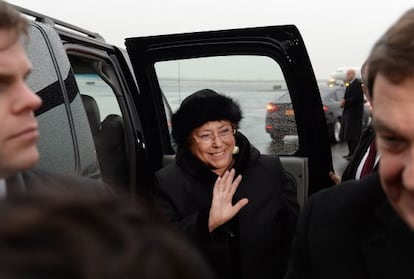Chile’s President Bachelet embroiled in campaign finance scandal
Local media say foreign nationals participated in fundraiser held on yacht in New York


Just as the Chilean Attorney General’s Office and public opinion had their eyes trained on the right-wing Independent Democratic Union (UDI) because of its involvement in an illegal campaign finance scheme known as Pentagate, the media has shifted its attention to President Michelle Bachelet.
Chilean law forbids foreign nationals without voting rights to make donations to Chilean political campaigns. But in September 2013, Foreign Affairs Minister Heraldo Muñoz organized a luncheon on a luxury yacht in New York to raise funds for the Socialist leader’s campaign run.
According to The Clinic, the publication that broke the story, and to Minister Muñoz himself, the attendees included several Latin American diplomats.
The news was followed by a series of confusing statements that have left La Moneda Palace in a delicate situation. The media soon dubbed the case “Yachtgate.”
Bachelet’s spokesman Álvaro Elizalde has accused the Independent Democratic Union of wanting “to create a situation to even the score”
Minister Muñoz, who was United Nations Development Programme Director for Latin America and the Caribbean at the time of the event, wrote a statement saying that they had only received funding from Chilean nationals.
But a few hours later Mario Paredes, the coordinator of the event, told TV station Canal 13 that foreigners were also present at the luncheon: “Puerto Ricans, Dominicans ... people from several countries.” Although he did not say whether they made donations to Bachelet’s campaign, Paredes had handed out an invitation written in English stating that participation was “possible with a $1,000 donation.” A copy of the invitation has been published by The Clinic.
“We will depart at 6pm from Pier 25 located at 225 N. Moore Street in Manhattan for a two-hour cruise aboard the 75’ Hatteras Motor Yacht Avanti which features many modern comforts, among which are a custom main salon with a high speed air conditioner, a sophisticated surround system around the boat and LED 6 tri-color underwater lights,” the invitation said.
Some members of the administration were so upset with Minister Muñoz that he was forced to issue a statement from New York, where Chile currently holds the rotating presidency of the United Nations Security Council. Muñoz read his remarks to the press and declined to take questions. He said there “were no donations by foreign nationals; everything was done within the bounds of the law.” He specified that the “donations made were inferior to the amounts indicated by some media outlets.”
Yachtgate has affected the nation’s top leaders. Interior Minister Rodrigo Peñailillo, who was Bachelet’s campaign manager, was forced to try to put out the fire. “I flatly rule out any irregularities,” he told the media. Along the same lines, Bachelet’s spokesman Álvaro Elizalde accused UDI of wanting “to create a situation to even the score.”
After the conservative party launched an operation to press for the administration to clear up the matter, Elizalde said: “UDI feels lonely and cornered as a result of the complicated legal situation that affects a significant number of its leaders.”
Meanwhile, the Penta case has revealed the delicate relationship that exists between politicians and financial donors, as well as the weak legal structure that regulates campaign financing in Chile. The Attorney General’s Office has found evidence suggesting that the Penta company made large donations to various political campaigns – mostly to UDI candidates – which surpassed the legal limit on campaign contributions while reaping tax cuts for their gifts.
Authorities have announced plans to formally accuse Penta owners and Pablo Wagner, former president Sebastián Piñera’s ex-undersecretary for mining, who faces bribery and money-laundering charges. Investigators will begin questioning politicians involved in the case this week.
Translation: Dyane Jean François
Tu suscripción se está usando en otro dispositivo
¿Quieres añadir otro usuario a tu suscripción?
Si continúas leyendo en este dispositivo, no se podrá leer en el otro.
FlechaTu suscripción se está usando en otro dispositivo y solo puedes acceder a EL PAÍS desde un dispositivo a la vez.
Si quieres compartir tu cuenta, cambia tu suscripción a la modalidad Premium, así podrás añadir otro usuario. Cada uno accederá con su propia cuenta de email, lo que os permitirá personalizar vuestra experiencia en EL PAÍS.
¿Tienes una suscripción de empresa? Accede aquí para contratar más cuentas.
En el caso de no saber quién está usando tu cuenta, te recomendamos cambiar tu contraseña aquí.
Si decides continuar compartiendo tu cuenta, este mensaje se mostrará en tu dispositivo y en el de la otra persona que está usando tu cuenta de forma indefinida, afectando a tu experiencia de lectura. Puedes consultar aquí los términos y condiciones de la suscripción digital.








































